-
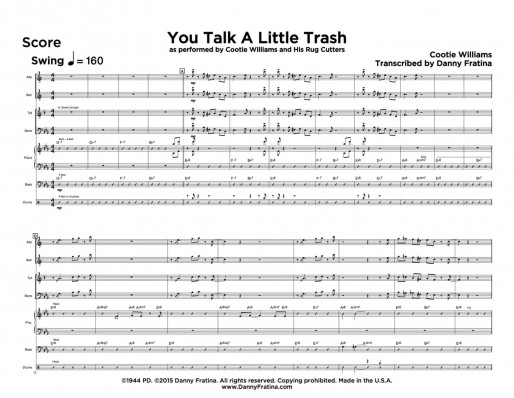 Aside from a little chromaticism on the bridge, You Talk a Little Trash is a solid level 1 swinger. Most of the melody is unison, the changes are simple, the tempo is an easy-going 160bpm, and the lines are timeless. Cootie Williams shows that you can do a lot with a little on this catchy chart.
Aside from a little chromaticism on the bridge, You Talk a Little Trash is a solid level 1 swinger. Most of the melody is unison, the changes are simple, the tempo is an easy-going 160bpm, and the lines are timeless. Cootie Williams shows that you can do a lot with a little on this catchy chart.Instrumentation Ellington 7-Piece Style Swing Era Level 1 TEMPO  = 160
= 160Trumpet
Range
-
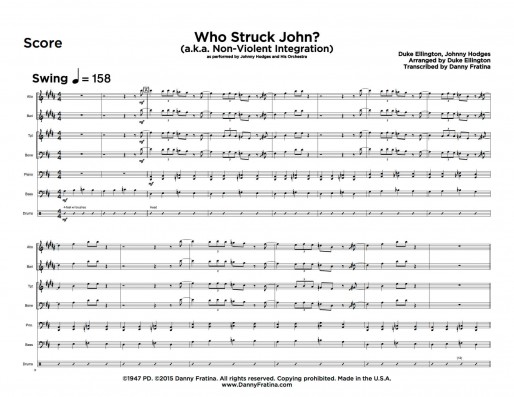 Also known as "Non-Violent Integration", Who Struck John? is a very simple but very cool head tune. This arrangement is unusual in its use of rock/metal style parallel fifths in the rhythm section, otherwise known in modern times as barre chords. This is a chart for jamming on a straight-ahead D Major blues, with solo space for nearly everyone.
Also known as "Non-Violent Integration", Who Struck John? is a very simple but very cool head tune. This arrangement is unusual in its use of rock/metal style parallel fifths in the rhythm section, otherwise known in modern times as barre chords. This is a chart for jamming on a straight-ahead D Major blues, with solo space for nearly everyone.Instrumentation Ellington 7-Piece Style Swing Era Level 1 TEMPO  = 160
= 160Trumpet
Range
-
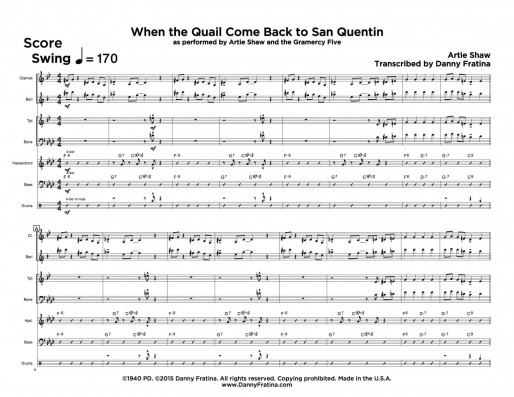 This hip Artie Shaw original features a little of everyone at the perfect dance tempo. Anecdotally, When the Quail Come Back to San Quentin was written in response to a music business insider's request for Shaw to play a sappy hit of the day. Shaw instead went live to air with this antithetical parody that seriously swings.
This hip Artie Shaw original features a little of everyone at the perfect dance tempo. Anecdotally, When the Quail Come Back to San Quentin was written in response to a music business insider's request for Shaw to play a sappy hit of the day. Shaw instead went live to air with this antithetical parody that seriously swings.Instrumentation Ellington 7-Piece Style Swing Era Level 3 TEMPO  = 170
= 170Trumpet
Range
-
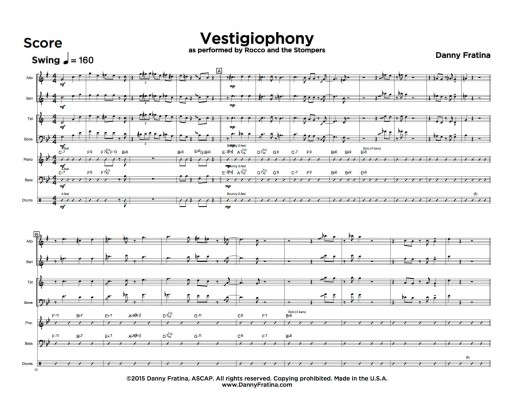 Vestigiophony is a winding dance tempo swing tune that is loosely based on Wayne Shorter's composition Footprints, if that tune was written and arranged by Duke Ellington for Johnny Hodges' seven piece band. Horns are often concerted in 4-part voicings, all building to solos, then to a shout chorus with drum solo fills.
Vestigiophony is a winding dance tempo swing tune that is loosely based on Wayne Shorter's composition Footprints, if that tune was written and arranged by Duke Ellington for Johnny Hodges' seven piece band. Horns are often concerted in 4-part voicings, all building to solos, then to a shout chorus with drum solo fills.Instrumentation Ellington 7-Piece Style Swing Era Level 4 TEMPO  = 160
= 160Trumpet
Range
-
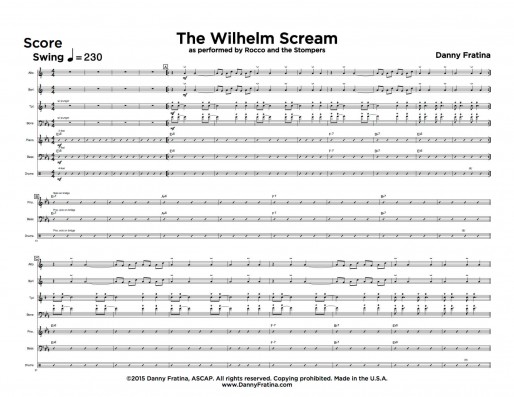 The Wilhelm Scream is a flag waving jam session tune in the spirit of a Basie-style Lester Leaps In or a Shaw-style Diga Diga Doo that is open for solos for any/all instruments in the band. Built modularly, there are unique horn backgrounds that can be played depending on which instrument is soloing, with a final cued shout chorus that brings the house down!
The Wilhelm Scream is a flag waving jam session tune in the spirit of a Basie-style Lester Leaps In or a Shaw-style Diga Diga Doo that is open for solos for any/all instruments in the band. Built modularly, there are unique horn backgrounds that can be played depending on which instrument is soloing, with a final cued shout chorus that brings the house down!Instrumentation Ellington 7-Piece Style Swing Era Level 3 TEMPO  = 230
= 230Trumpet
Range
-
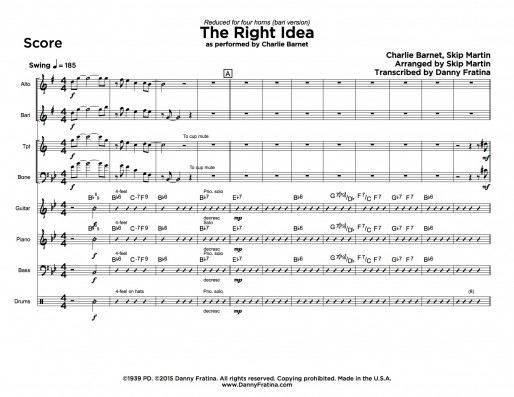 Charlie Barnet wrote a trio of "Idea" pieces: one that paid tribute to Duke Ellington, one that parodied the unhip bands of the day, and this one, The Right Idea, a piece that Barnet felt represented a quintessential swing chart. With solo space for several instruments and some great riffs and lines, you can tell right away that Barnet was spot on!
Charlie Barnet wrote a trio of "Idea" pieces: one that paid tribute to Duke Ellington, one that parodied the unhip bands of the day, and this one, The Right Idea, a piece that Barnet felt represented a quintessential swing chart. With solo space for several instruments and some great riffs and lines, you can tell right away that Barnet was spot on!Instrumentation Ellington 7-Piece Style Swing Era Level 3 TEMPO  = 185
= 185Trumpet
Range
-
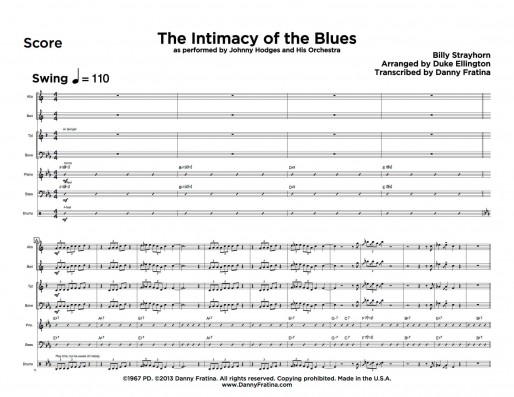 The Intimacy of the Blues is notable not just for it's striking melody--this was one of the very last compositions ever written by longtime Ellington collaborator Billy Strayhorn. This medium tempo Eb blues is good for a band of any skill level, and a great historical addition to your book.
The Intimacy of the Blues is notable not just for it's striking melody--this was one of the very last compositions ever written by longtime Ellington collaborator Billy Strayhorn. This medium tempo Eb blues is good for a band of any skill level, and a great historical addition to your book.Instrumentation Ellington 7-Piece Style Swing Era Level 1 TEMPO  = 110
= 110Trumpet
Range
-
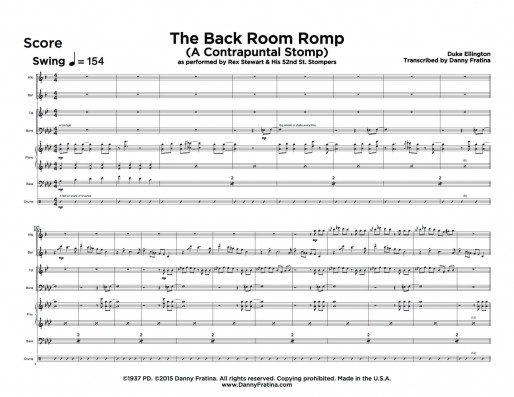 Back Room Romp is basically a simple blues in Ab, but there is a twist: the head is a series of building independent lines, thus a "Contrapuntal Stomp." Every horn player gets a solo chorus. The lead trumpet part is a bit of a blow, but this was written for longtime Ellington sideman, trumpeter Rex Stewart, who had the chops to play all day.
Back Room Romp is basically a simple blues in Ab, but there is a twist: the head is a series of building independent lines, thus a "Contrapuntal Stomp." Every horn player gets a solo chorus. The lead trumpet part is a bit of a blow, but this was written for longtime Ellington sideman, trumpeter Rex Stewart, who had the chops to play all day.Instrumentation Ellington 7-Piece Style Swing Era Level 3 TEMPO  = 154
= 154Trumpet
Range
-
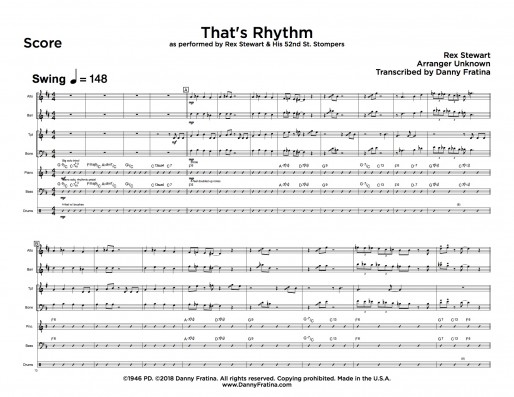 The unassumingly-titled "That's Rhythm" is a colorful tune that straddles the line between the swing era and the bebop era. Written by Ellington sideman Rex Stewart for his own shorter-lived 4-horn band, "Rhythm" features a punchy and memorable head and lots of solo space.
The unassumingly-titled "That's Rhythm" is a colorful tune that straddles the line between the swing era and the bebop era. Written by Ellington sideman Rex Stewart for his own shorter-lived 4-horn band, "Rhythm" features a punchy and memorable head and lots of solo space.Instrumentation Ellington 7-Piece Style Swing Era Level 2 TEMPO  = 148
= 148Trumpet
Range
-
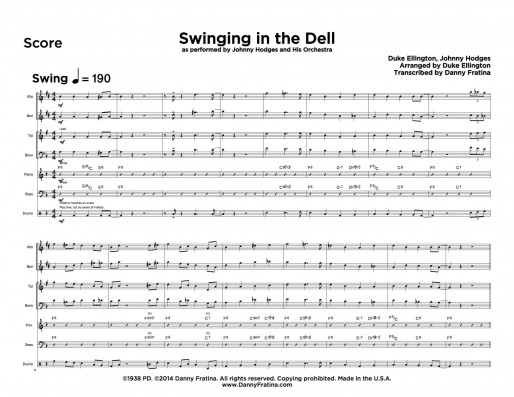 This upbeat Hodges/Ellington piece is a variation on the old nursery rhyme The Farmer in the Dell. After a statement of the melody, it's all solos with background riffs until the melody comes back at the end. Swinging in the Dell is a very simple solo vehicle that's great for getting dancers on the floor!
This upbeat Hodges/Ellington piece is a variation on the old nursery rhyme The Farmer in the Dell. After a statement of the melody, it's all solos with background riffs until the melody comes back at the end. Swinging in the Dell is a very simple solo vehicle that's great for getting dancers on the floor!Instrumentation Ellington 7-Piece Style Swing Era Level 2 TEMPO  = 190
= 190Trumpet
Range
-
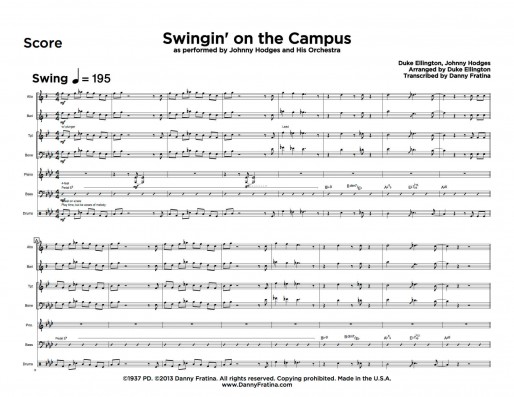 Swingin' on the Campus is an aggressive hard swinging tune jam packed with killer riffs and solo space. This simply-constructed piece is built on a variation of rhythm changes and is a difficult level 2 because of the relatively high tempo and brass endurance.
Swingin' on the Campus is an aggressive hard swinging tune jam packed with killer riffs and solo space. This simply-constructed piece is built on a variation of rhythm changes and is a difficult level 2 because of the relatively high tempo and brass endurance.Instrumentation Ellington 7-Piece Style Swing Era Level 2 TEMPO  = 195
= 195Trumpet
Range
-
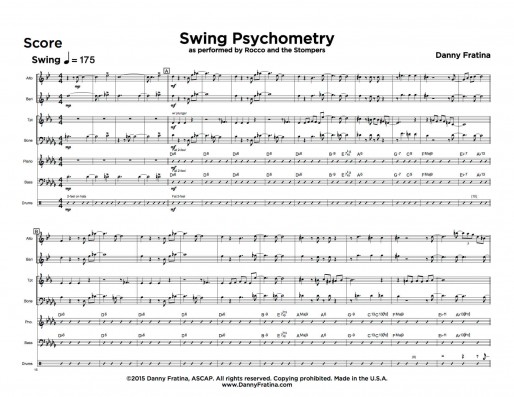 Swing Psychometry is a trumpet feature that pushes the limits of swing era vocabulary. Full of 10 bar phrases and Ellington and Coltrane-inspired harmony, this interesting piece pops out in your book as something unusual yet familiar.
Swing Psychometry is a trumpet feature that pushes the limits of swing era vocabulary. Full of 10 bar phrases and Ellington and Coltrane-inspired harmony, this interesting piece pops out in your book as something unusual yet familiar.Instrumentation Ellington 7-Piece Style Swing Era Level 4 TEMPO  = 175
= 175Trumpet
Range
-
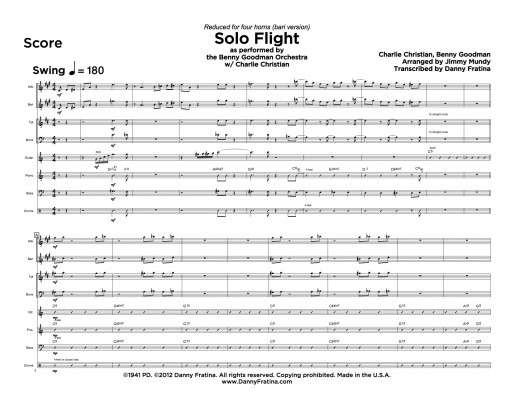 Around the age 24, Charlie Christian, not content with playing rhythm on every tune, wrote himself a soloing feature that has since become the guitar standard of the swing era. Solo Flight has lots of great wild punches from the band but it's all secondary to the guitar improvisation that dances around them. The chord changes have some familiar structures, but mixed in are slightly more modern chords with flashes of early bebop.
Around the age 24, Charlie Christian, not content with playing rhythm on every tune, wrote himself a soloing feature that has since become the guitar standard of the swing era. Solo Flight has lots of great wild punches from the band but it's all secondary to the guitar improvisation that dances around them. The chord changes have some familiar structures, but mixed in are slightly more modern chords with flashes of early bebop.Instrumentation Ellington 7-Piece Style Swing Era Level 4 TEMPO  = 180
= 180Trumpet
Range
-
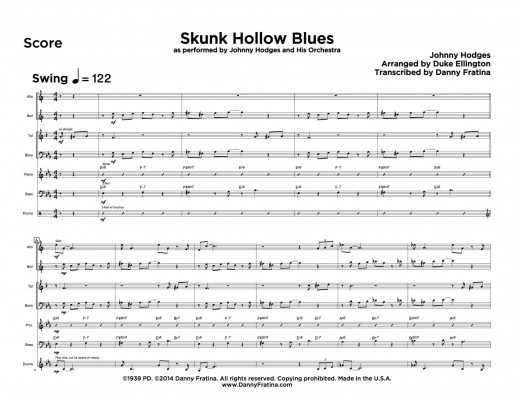 Skunk Hollow Blues is a very laid back colorful blues and a fantastic rare gem of the swing era. The intro and head features plunger trumpet on one line, bari and trombone on another, and the alto on a third melody, a rare true 3-part counterpoint! Riffs and triadic voicings back up a couple of solos, leading to an ending chorus that is half based on the head and half new material full of creeping chromatic motion full of dynamics.
Skunk Hollow Blues is a very laid back colorful blues and a fantastic rare gem of the swing era. The intro and head features plunger trumpet on one line, bari and trombone on another, and the alto on a third melody, a rare true 3-part counterpoint! Riffs and triadic voicings back up a couple of solos, leading to an ending chorus that is half based on the head and half new material full of creeping chromatic motion full of dynamics.Instrumentation Ellington 7-Piece Style Swing Era Level 2 TEMPO  = 125
= 125Trumpet
Range
-
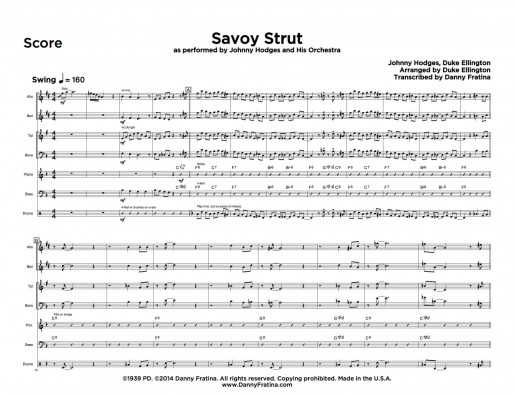 Savoy Strut is a major hidden gem from the swing era! Duke Ellington starts the tune up with an unusually angular intro, which takes us to a winding but singable head. The soloists play over a beautiful and remarkable chord progression which also features some player-specific orchestration choices that take advantage of the unique sounds of his players. A must-have for any Ellington 7-piece ensemble!
Savoy Strut is a major hidden gem from the swing era! Duke Ellington starts the tune up with an unusually angular intro, which takes us to a winding but singable head. The soloists play over a beautiful and remarkable chord progression which also features some player-specific orchestration choices that take advantage of the unique sounds of his players. A must-have for any Ellington 7-piece ensemble!Instrumentation Ellington 7-Piece Style Swing Era Level 3 TEMPO  = 160
= 160Trumpet
Range
-
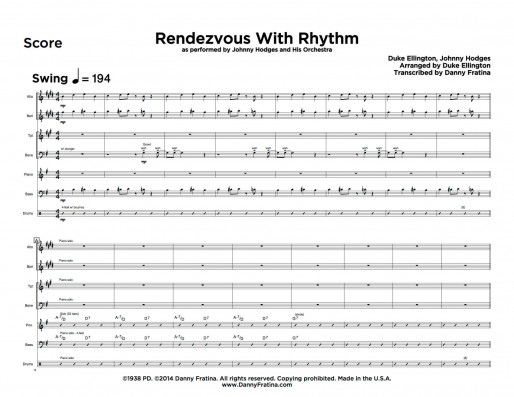 Rendezvous with Rhythm is a unique tune that bridges the gap between hot jazz and swing with plenty of space for solos. Simple riffs and a tidy shout chorus drive this deceptively swinging Ellington/Hodges chart to a quiet and abrupt ending.
Rendezvous with Rhythm is a unique tune that bridges the gap between hot jazz and swing with plenty of space for solos. Simple riffs and a tidy shout chorus drive this deceptively swinging Ellington/Hodges chart to a quiet and abrupt ending.Instrumentation Ellington 7-Piece Style Swing Era Level 3 TEMPO  = 194
= 194Trumpet
Range
-
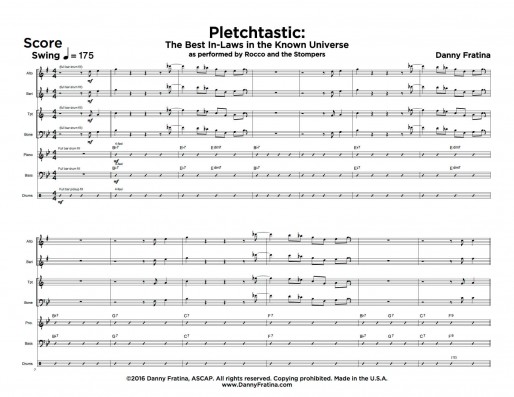 Pletchtastic is a tongue-in-cheek titled song commissioned for Club Drosselmeyer. A simple Bb blues riff melody, solos for every instrument, no backgrounds, and a big intro and ending makes this a great opener, closer, or mid-set rest piece for your horns.
Pletchtastic is a tongue-in-cheek titled song commissioned for Club Drosselmeyer. A simple Bb blues riff melody, solos for every instrument, no backgrounds, and a big intro and ending makes this a great opener, closer, or mid-set rest piece for your horns.Instrumentation Ellington 7-Piece Style Swing Era Level 2 TEMPO  = 175
= 175Trumpet
Range
-
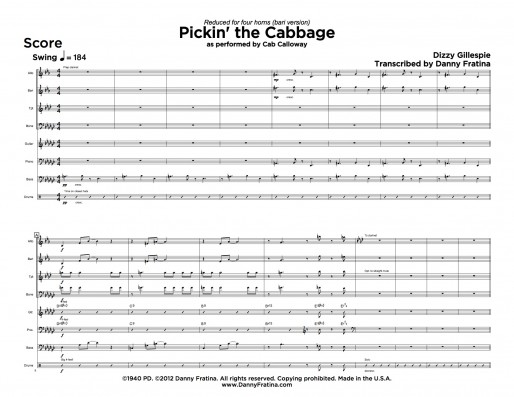 Written for Cab Calloway's band, Pickin' the Cabbage is Dizzy Gillespie's first ever big band composition. The slick tune features a great melody for a trio and many hints of modern bebop and afro-cuban music that would later be Gillespie's trademark.
Written for Cab Calloway's band, Pickin' the Cabbage is Dizzy Gillespie's first ever big band composition. The slick tune features a great melody for a trio and many hints of modern bebop and afro-cuban music that would later be Gillespie's trademark.Instrumentation Ellington 7-Piece Style Swing Era Level 3 TEMPO  = 184
= 184Trumpet
Range
-
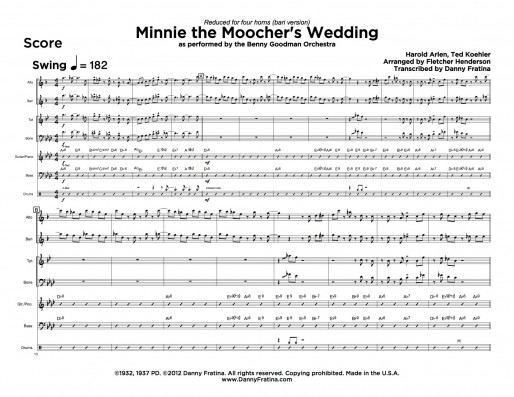 This wild piece starts out with Fletcher Henderson quoting of Mendelssohn's "Wedding March," but after two bars it's off to the races with tons of intricate riffs, solos, and a rowdy shout chorus at the end. Watch out for the lightening quick mute changing, which was standard practice in the 1930s. This piece makes a great wedding reception opener and many working bands using it now will open up the first solo section as a vamp to introduce a wedding party.
This wild piece starts out with Fletcher Henderson quoting of Mendelssohn's "Wedding March," but after two bars it's off to the races with tons of intricate riffs, solos, and a rowdy shout chorus at the end. Watch out for the lightening quick mute changing, which was standard practice in the 1930s. This piece makes a great wedding reception opener and many working bands using it now will open up the first solo section as a vamp to introduce a wedding party.Instrumentation Ellington 7-Piece Style Swing Era Level 4 TEMPO  = 185
= 185Trumpet
Range
-
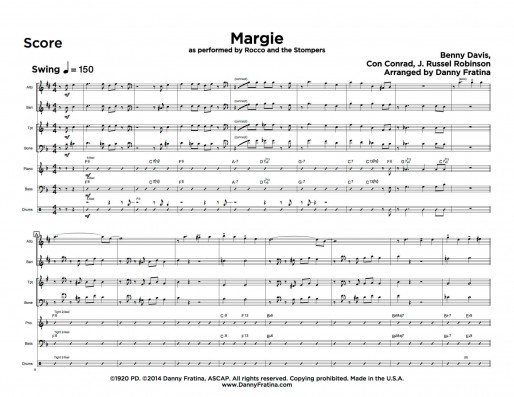 Margie is a classic early jazz standard that was popular during the hot jazz and swing eras and is due for a comeback! This alto feature is built up like a Sy Oliver/Jimmie Lunceford arrangement, with a simple melody part and a bouncy and angular 3-part horn counterpart.
Margie is a classic early jazz standard that was popular during the hot jazz and swing eras and is due for a comeback! This alto feature is built up like a Sy Oliver/Jimmie Lunceford arrangement, with a simple melody part and a bouncy and angular 3-part horn counterpart.Instrumentation Ellington 7-Piece Style Swing Era Level 4 TEMPO  = 150
= 150Trumpet
Range
Instrumentation: Ellington 7-Piece
STYLE
DIFFICULTY
VOCALS
PERFORMER
SOLOS
